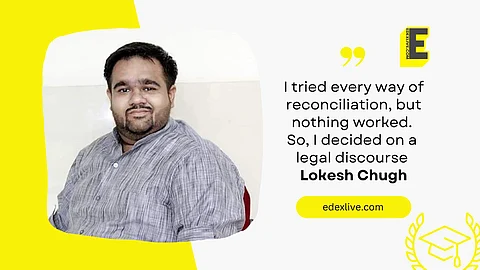

On April 19, the Delhi High Court asked Delhi University (DU) to file its response on the matter involving the debarment of a student for being allegedly involved in the screening of India: The Modi Question, a controversial BBC documentary on the Prime Minister. The screening itself happened earlier this year. Lokesh Chugh, a PhD scholar at the varsity, shares that the debarment notice took him by surprise as he was not involved in the screening. Moreover, it has hindered his academic progress.
Recalling the chain of events that led to his filing the case against DU at the high court, Lokesh notes that it all began on January 27. "A few reporters had called me for a discussion with DU ABVP (Akhil Bharatiya Vidyarthi Parishad) leader Akshit Dahiya that day. The protest was happening elsewhere. But the administration accused me of organising it," he tells. Lokesh is the National Secretary of NSUI (National Students' Union of India).
The debarment order reached him on February 16, after which, he was asked to meet the authorities. "I was asked to send a letter explaining why disciplinary action shouldn't be taken against me. I submitted it, mentioning that I wasn't present at the screening site. Delhi police had cracked down upon the spot and detained a few students. I was not among them and neither was my name in the FIR registered subsequently."
However, despite that, Lokesh says that he received the debarment notice on March 14, which was dated March 10. This was after he submitted his PhD thesis on March 3 and paid his fees online for his examination on March 9. According to the debarment notice, he could only appear for his examination after a year.
Appeals and urges
On March 16, the scholar's guide received a letter informing him of his debarment. "I wrote appeals to the proctor and the vice-chancellor, urging them to reconsider the matter and also for asked for a meeting, but to no avail," Lokesh says, adding that as a result, he decided to resort to a legal course.
"I have already submitted my thesis and paid the fees, which means that I am no longer a student of DU. And the examination in which I am to appear will be conducted by an external, with no participation from any teacher at DU. As such, the debarment is unjust," Lokesh says.
The matter reaches Delhi High Court
On March 29, Senior Advocate Kapil Sibal sent a notice to DU on behalf of the student, after which, the matter reached the HC. On April 18, the court stated that the DU order does not reflect an independent application of mind and directed the varsity to file its counter affidavit.
Speaking about the court's decision, Lokesh says that since the first hearing, the court had observed that he ought to have had a chance to be heard. "Now the court wants to see what the university's stand is," the scholar states.
It may be noted that one other student, Ravinder, also received a similar debarment notice over the alleged documentary screening. In a conversation with EdexLive, the student shares that he too is planning to take legal action soon. "A notice has already been served to the administration a month back," he says.
